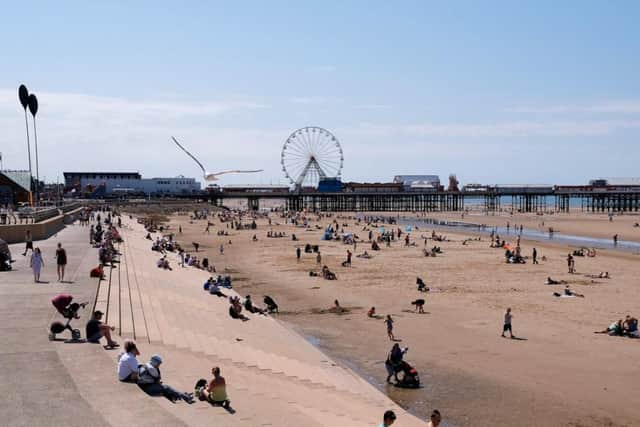The Covid situation in Blackpool on 'Freedom Day'
and live on Freeview channel 276
Clubbing? No problem. Offices? Get in there. Social distancing? Nah, just personal space.
Advertisement
Hide AdAdvertisement
Hide AdBut that's against a surge of cases that has left top doctors at Blackpool Victoria Hospital worried.


And the resort has one of the highest community infection rates in the country.
WHAT'S THE SITUATION AT THE VIC?
The number of people in hospital on the Fylde is rising again and "appear to be rising at quite a rapid and alarming rate", medical director Dr Jim Gardner said.
During his weekly coronavirus briefing last Wednesday, he said 29 people were in hospital and within 14 days of testing positive, up from 16 the week before.
Advertisement
Hide AdAdvertisement
Hide AdSome 23 were on general wards, five were at the Clifton Hospital in St Annes, and one was in intensive care.
One more death was announced, taking the toll to 771.
Visiting has again been largely banned at the Vic, in Whinney Heys Road, while an army of volunteers - who carry out tasks such as transporting blood - has been stood down after only returning to work last month.
Masks will still need to be worn inside the hospital too.
WHAT ABOUT IN THE COMMUNITY?
With more than 100 people testing positive every day, the resort has one of the highest community infection rates in the country.
At a rate of 633.2 per 100,000 people in the seven days to July 12, up from 436 the week before, Blackpool's rate ranks 22nd out of 315 local areas in England.
Advertisement
Hide AdAdvertisement
Hide AdThere were 883 confirmed diagnoses here, up from 608, Public Health England data showed.
South Tyneside continues to have the highest rate, with 1,978 new cases - the equivalent of 1,310.1 per 100,000.
Fylde's rate is 555.8, up from 355.3, while Wyre's is 567.4, up from 378.3.
Blackpool's director of public health, Dr Arif Rajpura, said recently the Delta variant is behind the majority of cases.Dr Gardner said the surge is “predominantly” amongst the under-60s, who “by and large have been unimmunised”.
WHAT'S CHANGED TODAY?
Advertisement
Hide AdAdvertisement
Hide AdSocial distancing limits are largely over, with no more “rule of six” and “one metre plus” restrictions.
Groups of more than six people from multiple households will be able to hang out indoors and outdoors.
Businesses will reopen, including shuttered nightclubs who can welcome party-goers back to dance floors.
Legal limits on mourners at funerals and those celebrating weddings will also end, as will school bubbles.
Advertisement
Hide AdAdvertisement
Hide AdLegally, face coverings will mostly no longer be mandatory in indoor settings.
From today, people can begin enjoying concerts, theatres, and sports events once again.
The Government is no longer instructing people to work from home but is encouraging a gradual return.
Friends and relatives visiting care home residents will still need to wear protective equipment and will be advised to minimise physical contact.
Advertisement
Hide AdAdvertisement
Hide AdBut there will be no limit on the number of "named visitors" a resident can receive and no national limit on how many can visit in a single day.
WHAT ARE EXPERTS SAYING?
With new cases of the virus already having passed the 50,000-a-day mark, some scientists have expressed concern at the ending of restrictions while the Delta variant is spreading so rapidly.
Professor Neil Ferguson – whose modelling led to the first lockdown in March 2020 – said they could reach 200,000 before the current wave of the pandemic finally peaked.
He said that could result in 2,000 hospital admissions a day leading to “major disruption” and further backlogs in NHS services.
Advertisement
Hide AdAdvertisement
Hide AdMeanwhile businesses have warned of shortages on the shelves as the number of people off work after being pinged by the NHS Covid app continues to rise.
Some charities have expressed dismay over people being able to ditch face masks from next week.
People who are clinically extremely vulnerable will be advised by the Government to avoid others who are unvaccinated when restrictions are eased.
Those at risk of serious illness from Covid-19 should continue to meet outdoors where possible